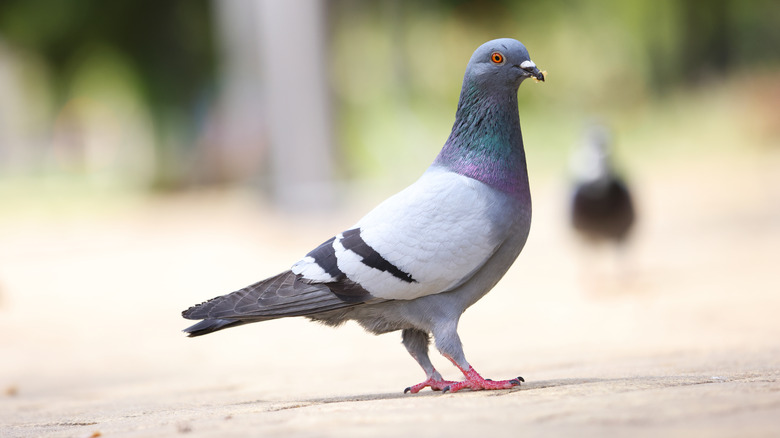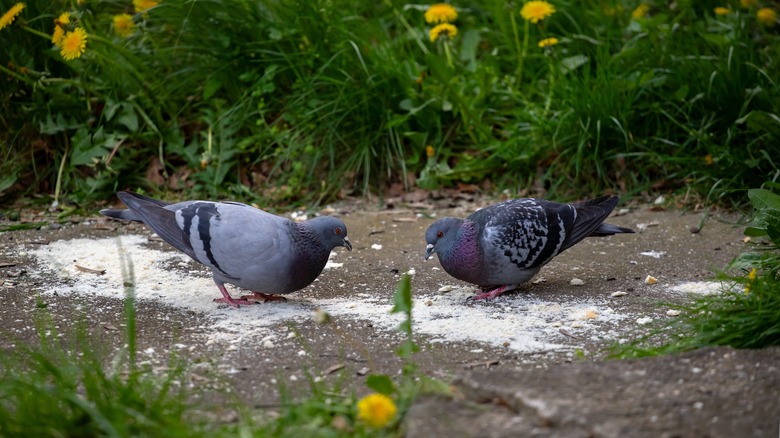If You See This Bird In Your Yard, You Have A Problem On Your Hands
There are lots of reasons to attract birds to your yard including keeping some really annoying insects away from your patio and plants. They can also be fun to watch on bird feeder cams and cavorting in birdbaths. But there are a host of birds you do not want to be seeing in your yard, and pigeons are among them. While there are several different types of pigeons that inhabit the United States, the ones you'll notice being a nuisance usually have gray bodies, two black stripes on their wings, a black band on the tail feathers, and feet that are reddish in color.
What's so bad about pigeons? There are several good reasons why the creatures garner nicknames like flying rats and gutter birds, and high on the list are the varied illnesses they harbor and spread. This includes Cryptococcosis, Histoplasmosis, and Psittacosis (per NYC Health). These fungal and bacterial infections are particularly problematic for people with comprised immune systems. Exposure comes with breathing dust and spores that spread to the air when cleaning up all the droppings pigeons leave in their wake. There have been reports of diseases like encephalitis and salmonella associated with them as well. And while keeping yourself and your family healthy is a top priority, there are some other problems these birds can bring with them worth knowing about.
Other problems with having pigeons around your yard and home
Pigeons haven't been all bad in the annals of history. They've been served as food delicacy (commonly called squab) and carrier pigeons, also known as homing pigeons, have proved useful for delivering messages as far back as the 15th century. Unfortunately, though, pigeons don't have as many fans as those handy birds. If the diseases associated with pigeons aren't enough, they also carry a horde of insects including ticks, fleas, and certain mites. Since all of these insects can bite humans, they're annoying to have around at the very least and some of those biters spread illnesses of their own.
Another potential problem is pigeon excrement; beside the fact that it looks awful and smells worse is the acidic nature of the droppings. When allowed to build up, they can eat away at awnings, gutters, and other items made of metal. You'd think stone would be impervious, but it can also erode over time with continual exposure to pigeon dung. And as you can imagine, if it's going to affect metal and stone it can scorch the grass on a lawn in even less time. Steering clear of pigeon poo, and the birds in general, is the easiest way to avoid the disease, pests, and damage they can incur to your property.
How to deter pigeons from your yard
Wondering about commercial deterrents to keep pigeons out of your yard? Anything noisy will likely annoy neighbors within earshot more than pigeons, and they're not afraid of balloons, fake snakes, etc. Chili peppers aren't the best choice for keeping pesky pigeons away for good either. There are several other things you can do to make your property inhospitable without harming them, though, including spraying a solution of one part vinegar to one part water where they congregate since they don't like the scent. You can also chase them away with your hose nozzle, but you'll have to spray them frequently until they vacate your premises for good.
Blocking openings in eaves and vents with wire mesh or installing strips of metal prongs commonly called porcupine wires to keep them from landing on fences and ledges are things to consider, too. If you decide to pigeon-proof a nesting area, you'll want to remove the old nest first. It will likely contain guano, so be sure to wear gloves, a mask, and washable clothing as you work.
The other things pigeons look for in a living area is easily accessible food and water. Be sure to keep garbage cans covered and don't leave out anything they might enjoy snacking on. Common sense dictates that bird feeders and baths should go unfilled until you can get them to move along. With a bit of diligent effort, you can indeed get a pigeon problem under control.



